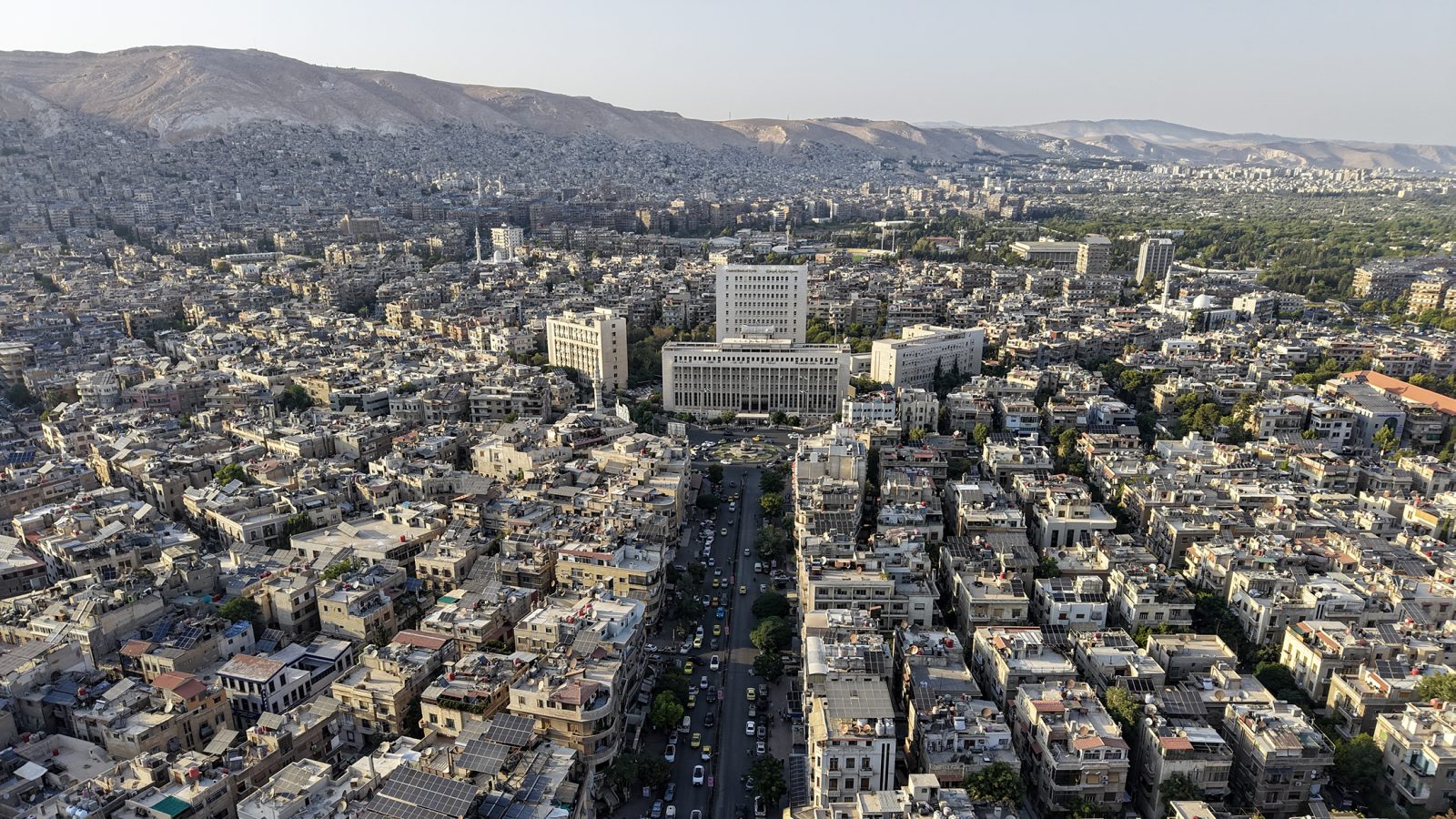At the end of November, Hamza Hourani’s phone rang. It was a cloudy morning in Damascus, and some Syrians were quietly stocking their cupboards as rebel fighters marched south toward the city after seizing much of the rest of the country. But the government of Bashar al-Assad still controlled the capital.
On the other end of the line was an official from the Ministry of Communications, summoning the 26-year-old Hourani and his co-founder, Bashar Saaduddin Al Jbawi, to its offices to discuss their startup: an education app called Quizat.
The communications ministry, located in a traditional Damascene marble building next to the Parliament, was viewed by many Syrians as an extension of the feared Mukhabarat, the country’s sprawling intelligence apparatus. Hourani stayed at the office, waiting nervously as Al Jbawi attended the meeting, where the ministry official, with a polite smile, grilled him about their business.
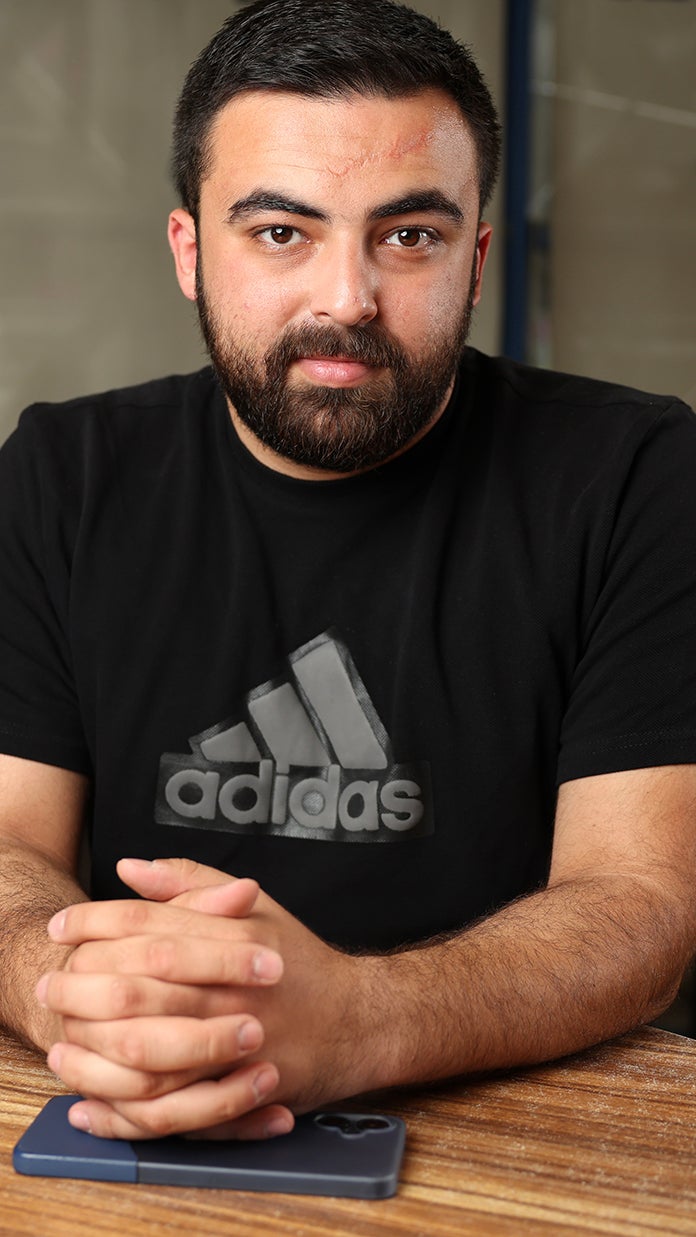
Quizat founder Hamza Hourani.
Quizat helped high-schoolers learn with games and quizzes. Officially running for over a year, it had been downloaded by around 15,000 students. But despite months of visits to the relevant government departments, the company had struggled to obtain an operating licence.
The official warned Jbawi that he and Hourani faced arrest for operating without a license. He also asked them to withdraw Quizat from the app store. The pair believed the meeting was part of a wider squeeze on educational apps and websites. Even in its dying moments, a regime crippled by sanctions and war was trying to take cuts from its impoverished citizens.
The official left the Quizat founders with a list of demands. The ministry did not want them to use a server based outside the country. It demanded access to their customer database. And it wanted a cut of their profits, on top of taxes. A follow-up meeting was arranged for Sunday, December 8.
When the day arrived, Hourani woke up fearing the meeting could lead to arrest. But it never happened. Instead, rebel fighters stormed the capital that morning. Regime forces melted away, and Assad, whose family had ruled for more than 50 years, fled to Moscow.
Fourteen years of a grinding civil war were over. Over half a million people were dead, the economy was in a freefall, and state coffers were drained. The country would now be ruled by the leader of Hayat Tahrir al-Sham — then a U.S.-designated terrorist group credibly accused by human rights groups of detaining and torturing civilians. Hourani had no idea what might come next. He packed up his office and rushed home.
The next morning, though, Hourani was surprised to find the capital calm. He called his employees to congratulate them on Assad’s fall and then went outside to celebrate. For the first time in years, he told Rest of World, he felt optimistic for Syria — and a nascent tech economy he had always hoped would help his long-suffering country.
“It was our dream, but it was surprising,” Hourani said of watching his country change overnight. “The first thing that happened when the regime fell is that the mobile phones started working again!” It was, maybe, a good omen.
Syria’s conflict began in 2011 as a peaceful uprising against Assad amid a wider Arab Spring. As regimes in Tunisia, Egypt, and Libya fell, many Syrians hoped their country would follow. But Syria’s government responded to street protests with extreme force, and a brutal civil war quickly drew in government forces, rebel groups, Islamist extremists, and foreign powers. The country of more than 22 million people spiraled into one of the worst humanitarian crises of the century.
Syria’s social media-savvy generation had played an important role in the spread of the country’s initial demonstrations, as many Syrians got around the country’s extensive internet censorship with proxy tools.
In 2011, Syria’s tech scene, while small, had been slowly emerging. The government explicitly encouraged students to take up degrees in science and technology, and local universities were producing skilled engineers and programmers. Many young Syrians were highly literate in math and science, and there was a growing interest in coding and tech jobs.
Syria’s tech industry remained extremely cautious, however, for fear the government would try to co-opt their enterprises, or crack down on them. The Syrian economy under Assad was characterized by widespread cronyism, and many large companies were controlled by relatives or allies of his regime. Smartphone penetration was low, with a clear digital divide between cities and rural areas. Popular apps from abroad like WhatsApp and Skype were widely used but occasionally blocked. Many Syrians relied on virtual private networks to bypass restrictions and maintain access to essential services and information.
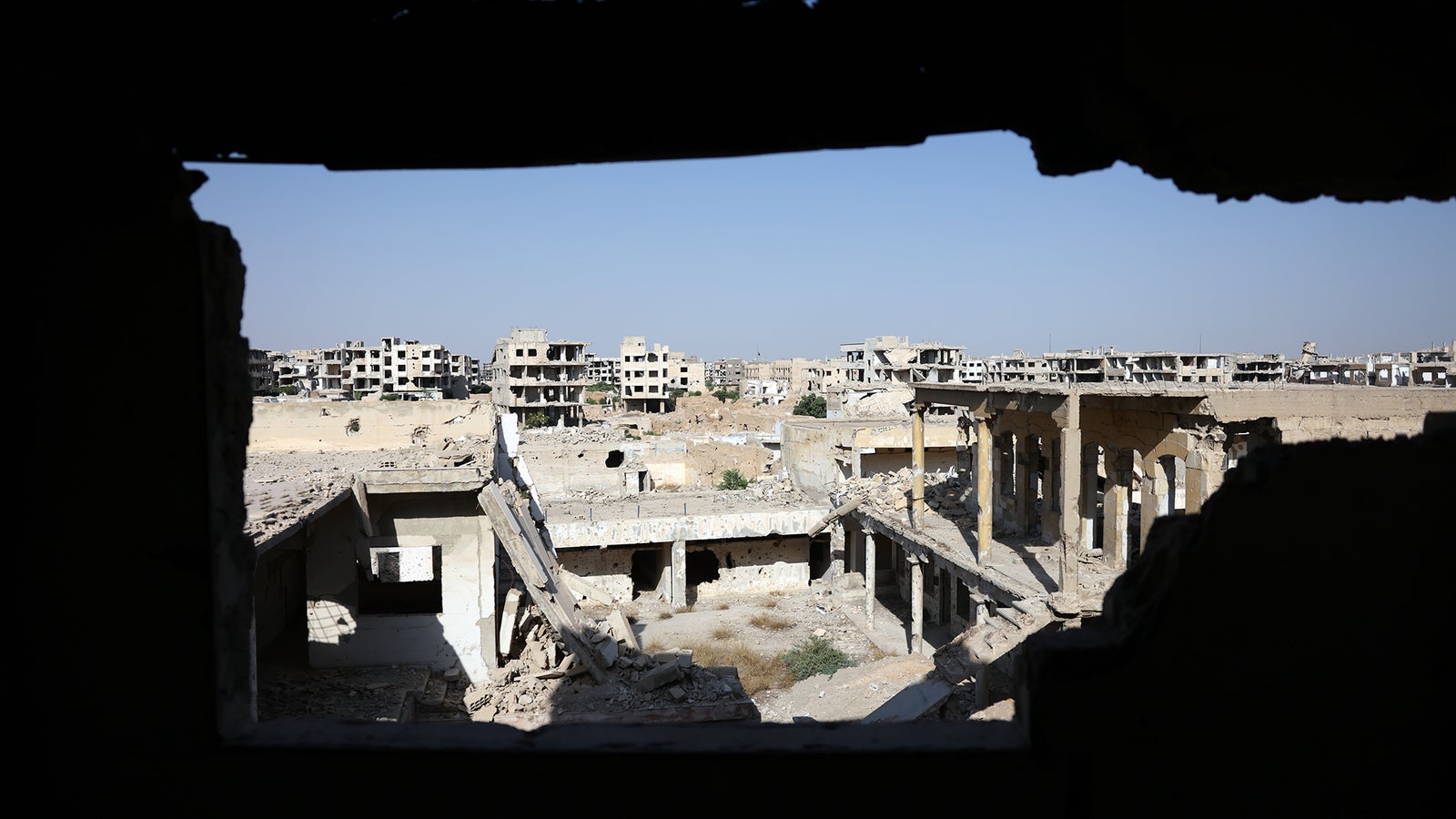
War-damaged buildings in the suburbs of Damascus.
As the conflict pushed some 13 million Syrians to flee their homes in one of the largest global displacements since World War II, among them was an exodus of tech talent. While regional neighbours saw a tech explosion embracing online services, e-shopping, and fintech in the 2010s, the war left Syria largely disconnected. Digital infrastructure was destroyed, digital payment options were scarce, and internet speeds remained painstakingly slow. While state institutions were heavily staffed, they operated with minimal efficiency behind stacks of paperwork. Almost all the elements needed for a tech ecosystem were largely missing — from incubators to accelerators, mentorship, training, seed funding schemes, and venture capital.
Sanctions imposed by the U.S. and other Western powers — intended to limit the regime’s ability to wage the war, force political reform, and push accountability for human rights abuses — left Syrians even more economically isolated.
[Assad] wanted us to leave, and I was going to stay. Staying here was defeating him.”
Despite these limitations, a handful of Syrian tech companies managed a level of breakthrough success during the war. The ride-hailing app YallaGo hired drivers across the country, and the on-demand food and grocery delivery platform BeeOrder was headquartered in Damascus with branches in four other cities.
To many Syrians, Hourani told Rest of World, these apps offered a glimpse of a more streamlined, contemporary way of living. “When we want to order food in Syria, we say we’re getting YallaGo, even if we’re using another app,” he said. “They were more than just apps. … BeeOrder started offering training workshops for young people in Damascus on how to launch a startup. They became like an academy.”
YallaGo founder Khaled Moustafa told Rest of World his company tussled endlessly with the state, which demanded they share their customer and driver databases, hand over shares, and pay off regime officials. Tensions with the Assad regime reached a tipping point in late 2020, when authorities switched off access to the proxy server that hosted the YallaGo app.
“The streets went crazy,” recalled Moustafa. In a country where, according to the United Nations, almost nine in 10 Syrians lived below the poverty line, YallaGo had become a source of income for around 15,000 families and an almost essential service for half a million customers. Protests against the Assad regime during the war had seen tens of thousands of Syrians killed or thrown in prison in forceful crackdowns, but supporters of YallaGo took to the streets and social media in a rare, public show of anger. Within 24 hours, authorities switched the server access back on. But like other companies, YallaGo was later forced to move its servers and database to be hosted locally in Syria — a slow, expensive, and invasive switch.
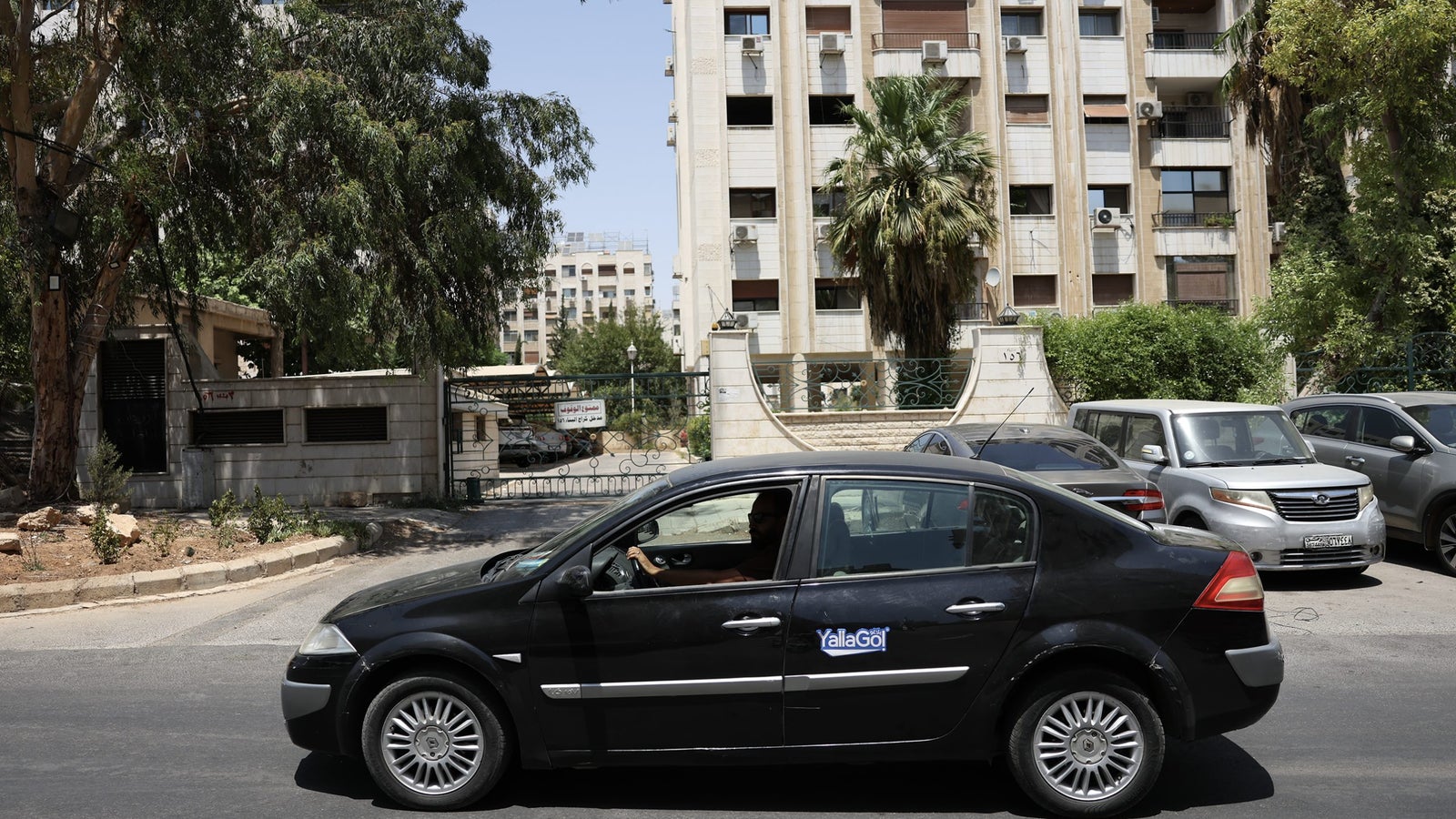
A YallaGo driver makes deliveries in Damascus.
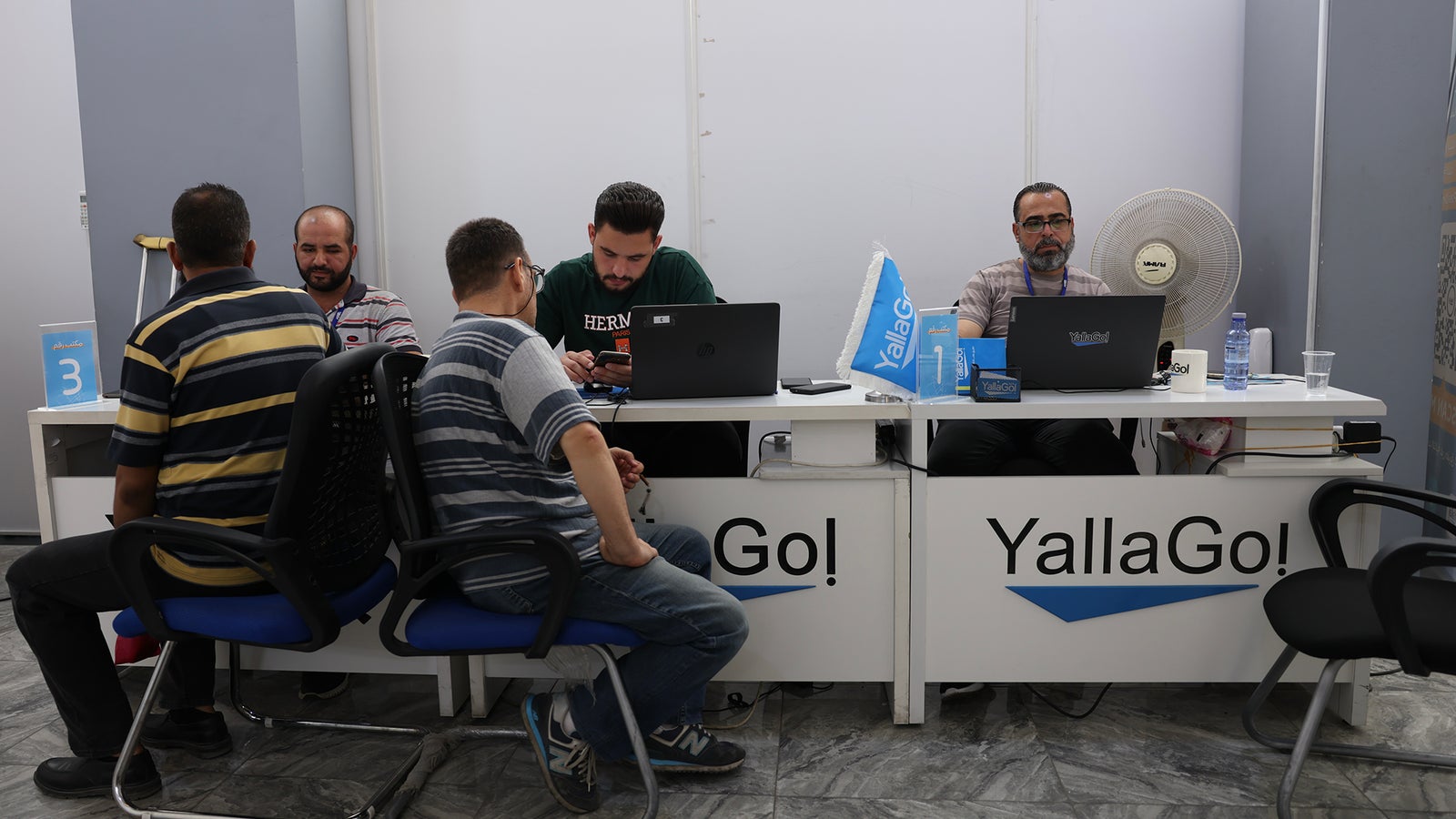
YallaGo employees at their Damascus headquarters.
Moustafa had left Syria before the war, in 2001. Speaking from his office in Dubai, he told Rest of World he felt a strong responsibility to support those who stayed. “Syria is still kind of offline when it comes to multiple services, from e-payment to online verification tech, delivery, e-government, the simplest things,” he said.
The U.N. reports that only a third of the population is now connected to the internet — with around 70% reliant on limited 3G networks. Syria also ranks 163rd out of 193 countries in the E-Government Development Index.
But Moustafa, like other Syrian tech optimists, hopes that a new wave of innovation can help the country begin to bounce back.
And in the biggest contrast from the past, entrepreneurs say, the new government isn’t just getting out of the way — it’s inviting them to collaborate in the rebuilding process.
Almond and citrus trees were blooming in Damascus. On a Wednesday this past spring, Hourani and 15 other app and business owners gathered in the iconic Rawda Cafe, just across the road from Parliament, to do the once unthinkable: freely discuss their ideas with a Syrian government official.
Shortly before being appointed Syria’s new minister of communication and information technology at the end of March, Abdulsalam Haykal had invited members of the country’s tech and business community for a coffee. With its traditional arched windows, a wide leafy terrace, and timeworn wooden chairs, the Rawda Cafe has been a popular spot for politicians and intellectuals since the 1930s. In the early days of the war, however, it became a meeting point for activists, and the regime responded by inserting informants among the staff and clientele, stifling discussion. Now it was roaring back to life.
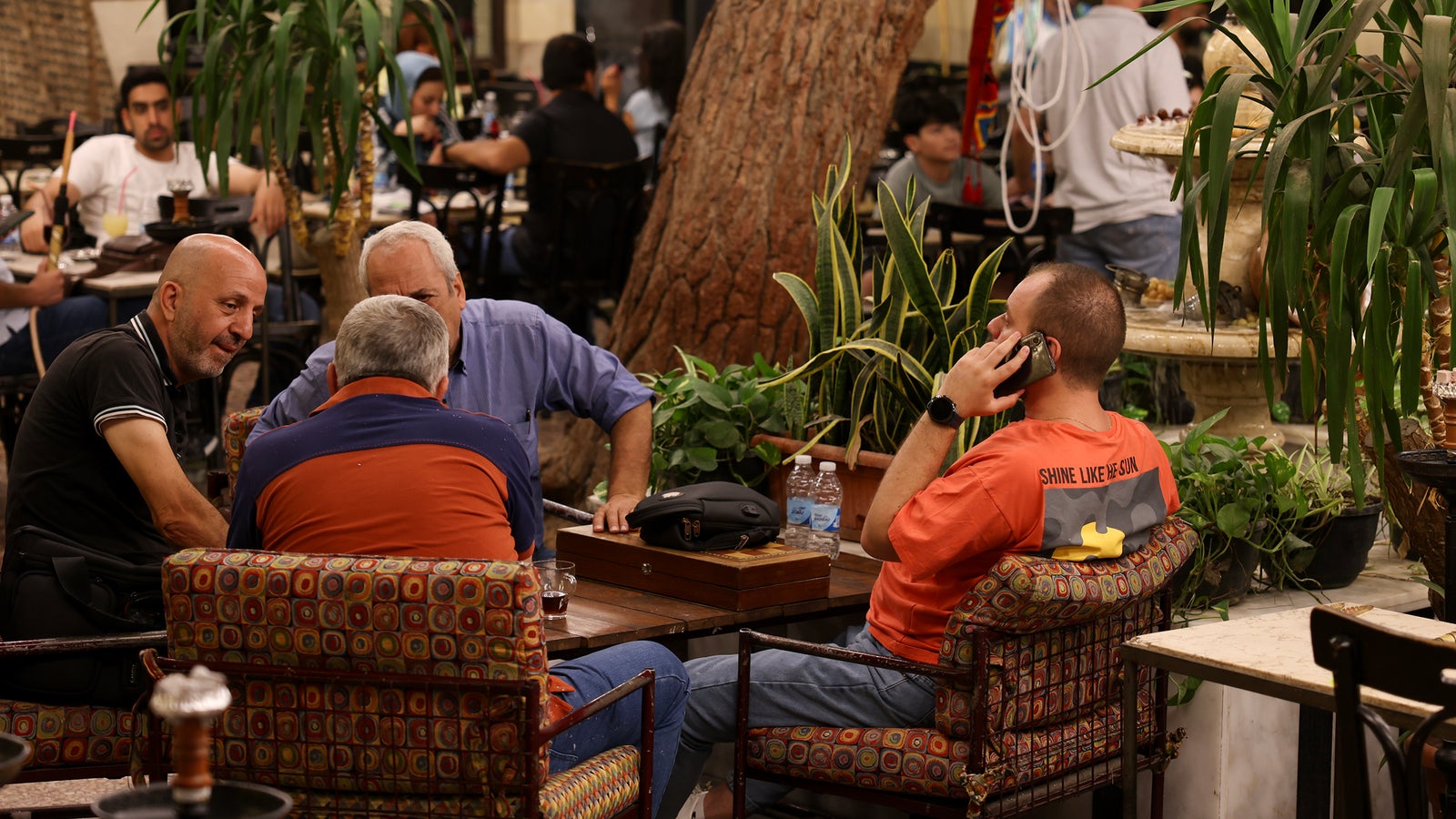
The iconic Rawda Cafe.
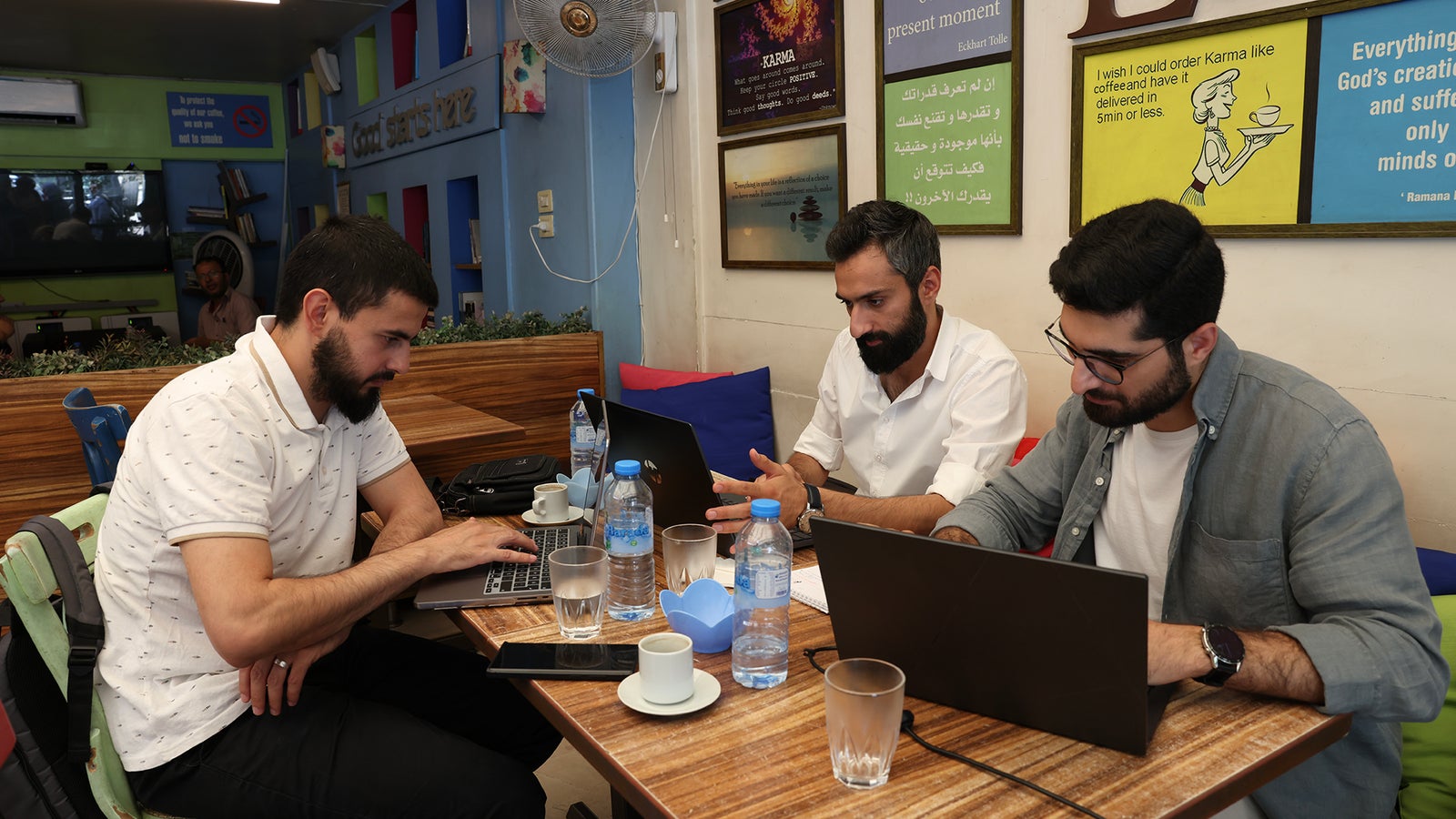
Patrons use the internet at a cafe in the diplomatic quarter of Damascus.
The small group sat around a table and talked about the future of Syria and how tech could contribute to its rise. “He was so kind and open to all our ideas and initiatives,” Hourani said. “We discussed all the problems and obstacles, and he clearly understands the technology sector.”
A tech and media entrepreneur in his own right, Haykal, 46, had left Syria in the early days of the conflict. In 2009, the Damascus native was the first Syrian to be named a Young Global Leader by the World Economic Forum. Until returning to Syria after the fall of the Assad regime, he lived in the United Arab Emirates as the CEO of his grandfather’s business, Haykal Group, which had invested in various sectors including enterprise software and mobile technology.
These are serious people who want to bring about change.”
Haykal charmed Syrians in his induction speech as the new minister of communications, in which he admitted he’d used ChatGPT to cut the address in half. As one of his first acts in office, he issued an order to cancel all licensing systems, permits, and fees previously imposed on providing services through online applications. The feared Mukhabarat would no longer be involved in the process; developers needed only to register their businesses online. Haykal pledged to advance digital transformation, improve nationwide telecom infrastructure, and support entrepreneurship by leveraging local and expatriate talent in partnership with the private sector.
Hourani could not believe government officials were now calling him for advice as they tried to untangle the regime’s archaic rules, layers of corruption, and antiquated way of doing things. “These are serious people who want to bring about change, and we, together with them, want to achieve that,” he said. “We want to rebuild our home properly.”
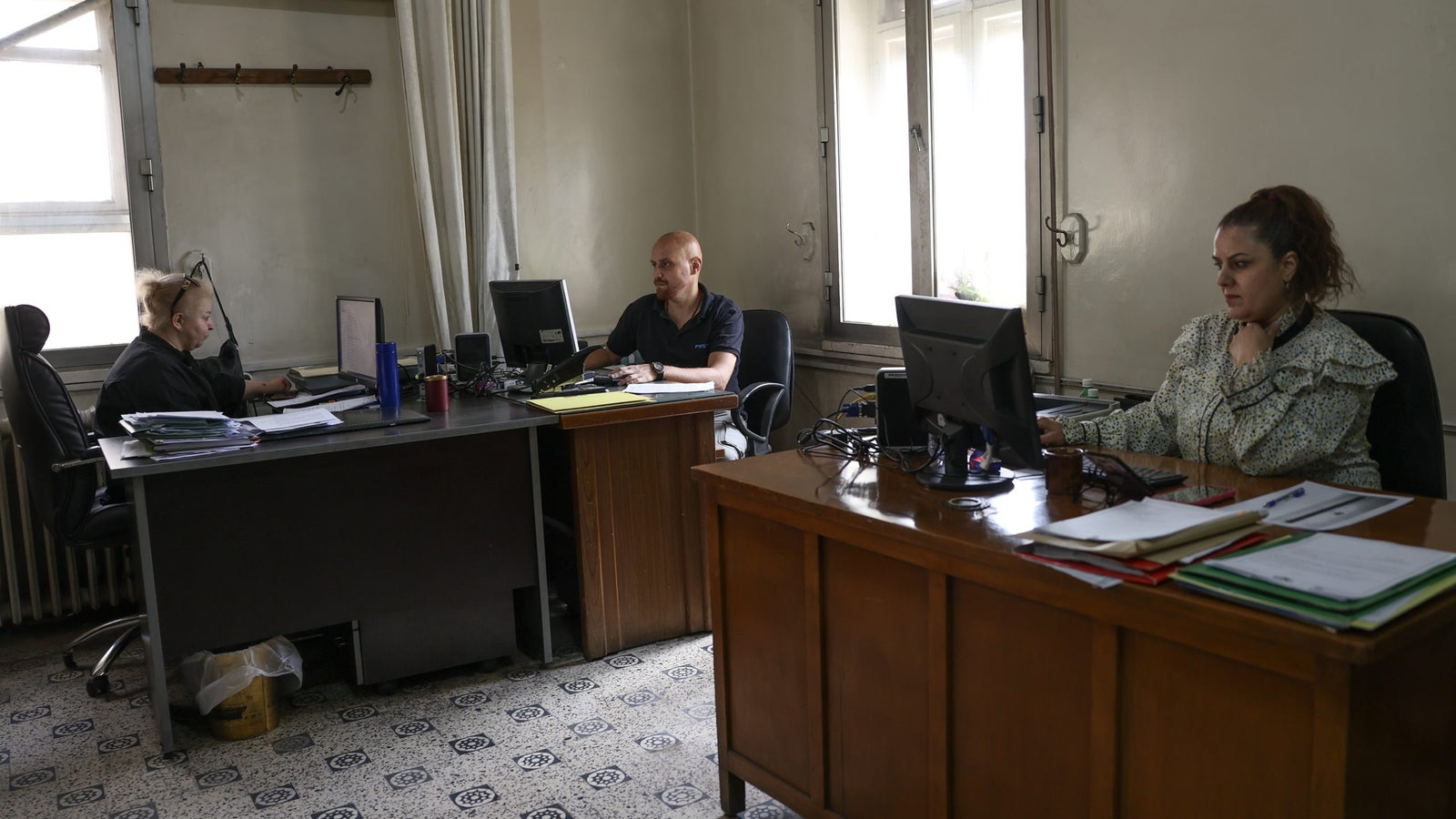
Employees inside Syria’s Ministry of Communications.
Over half a dozen Syrians in the tech community told Rest of World they believed the country’s new rulers had integrity, were approachable, and were willing to listen. Hourani compared the flurry of activity he was witnessing to frantically tidying your home before guests arrive — he could see the new authorities were working as fast as they could to make Syria’s new order acceptable to citizens.
Syria’s leader, Ahmad al-Sharaa, formerly known as Abu Mohammed al-Golani, was designated a terrorist in 2013 by the U.S. after declaring his militant group, the Nusra Front, as a Syria affiliate of al-Qaeda. The terrorist designation carried over to Hayat Tahrir al-Sham, which Sharaa formed in early 2017 after saying he’d severed ties with al-Qaeda. According to the U.N., HTS was responsible for arbitrary detention and torture, summary executions, and the persecution of women under harsh social restrictions in areas it controlled as a rebel group.
Since taking over the country, Sharaa had received cautious praise for showing restraint and statesmanship. He laid out plans for rebuilding a more united Syria. Many Syrians in minority groups, however, have remained unconvinced, and sectarian armed groups have largely kept their weapons amid outbreaks of communal violence.
Despite this uncertainty, Hourani was plotting how to expand Quizat, including outside the country. He is unmistakably Damascene — quick-witted and, with his soft, elegant accent, often dropping local proverbs into conversation. Born to a religious, middle-class family in 1999, like many in the capital, he did not support the Assad regime but remained neutral to avoid trouble.
After getting his education in religious studies and securing a law degree from Damascus University, Hourani knew he didn’t want to follow the well-trodden path into government officialdom, or to become a judge. He often contemplated leaving the country, but became passionate about improving Syria’s education sector while working as a school administrator to help fund his degree. After graduation, he joined a small group of friends to tutor students and then spent years honing his app.
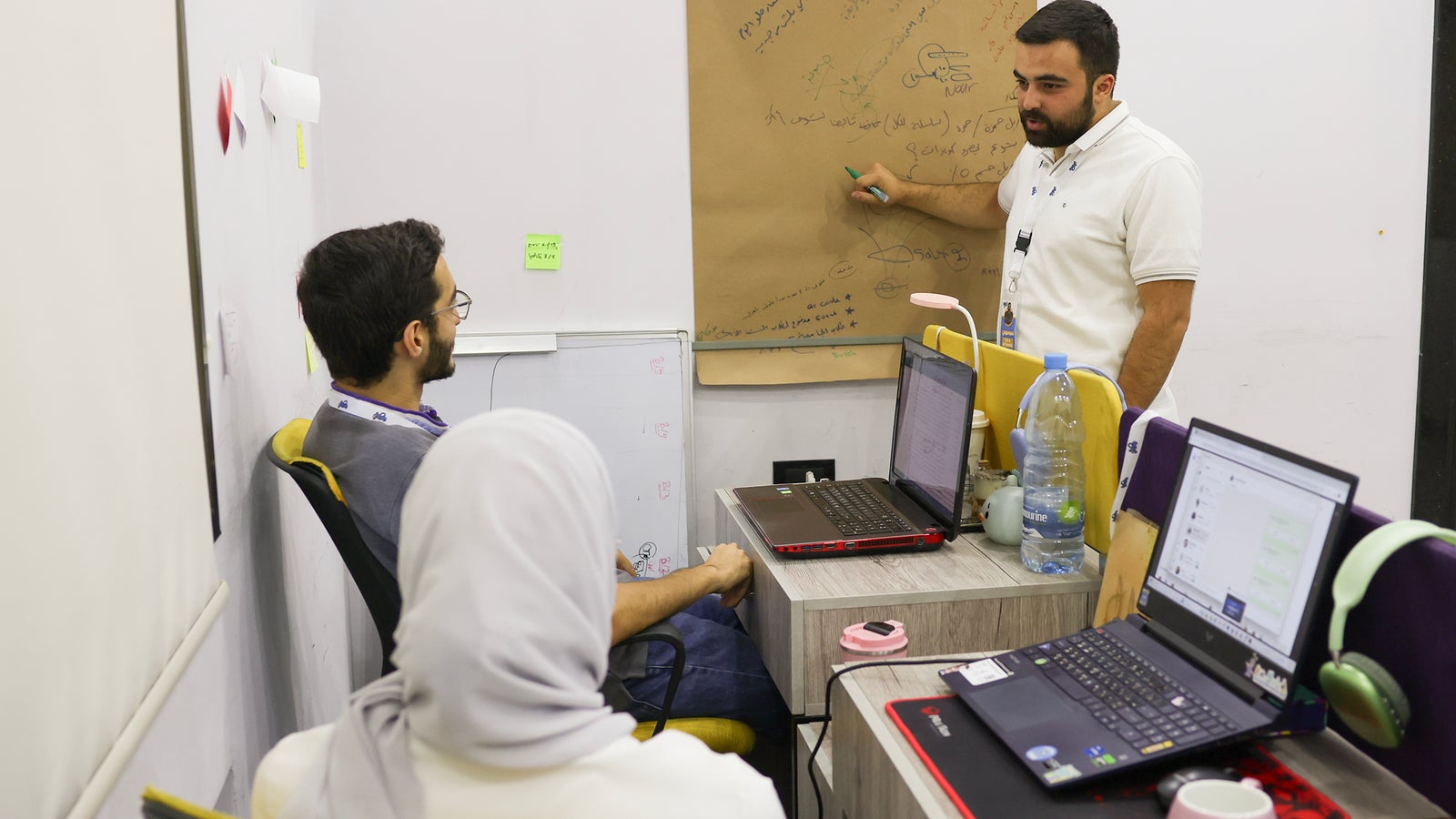
Hourani and staff at the Quizat headquarters.
Hourani avoided the military draft with a high blood pressure diagnosis and a bribe. For him, quietly growing his business was a form of resistance. “As far as I was concerned, I wanted to contradict [Assad]. He wanted us to leave, and I was going to stay,” he said. “I believed in what I was doing. Staying here was defeating him.”
Sitting in his office in downtown Damascus, Hourani was clearly proud of his achievement. Above a handful of chairs upholstered in the company colors of bright yellow and blue, there was a whiteboard and a scroll of brown paper covered in Post-it notes scribbled with diagrams and ideas. “I think it’s easy to be successful outside Syria. It’s way more difficult to be successful inside,” he said. “I have taken very small steps, but I am hanging in there.”
His company reflects another shifting dynamic in Syrian society — the majority of Hourani’s nine employees are women. Data from the community-led organization Startup Syria showed the percentage of female entrepreneurs rose sharply during the war — from just 4.4% of female-owned startups in 2009 to 34.7% in 2025. With many men forced to flee or join armed groups, or killed or detained, women increasingly stepped into the workforce to support their families.
Syria will be the ultimate disruptor.”
Since the fall of the regime, Quizat has grown. It hired a senior programmer to introduce AI-driven educational features, and Hourani said it was in talks with investors to expand beyond Syria.
Meanwhile, Khaled Moustafa, still based in Dubai, wanted to expand YallaGo, too, and was in the process of launching an academy to create a hub for ideas and aspiring entrepreneurs. Moustafa had built the company using his savings and money from relatives. He felt that until U.S. sanctions were lifted, foreign investors would remain reluctant and tech startups would continue to struggle. “The only thing that has changed is people’s spirit,” he told Rest of World in March. “The economic and social situation is still pretty much the same, but it starts with a great spirit.”
And then there was the sudden return of millions of Syrians. “We have a new generation who have been working for Google, Apple … and they’re just emerging out [of exile],” Moustafa said. “So, they will be able to build. We will be able to rebuild.”
A group of Silicon Valley-based Syrian entrepreneurs staged the country’s largest ever tech conference in Damascus in February. Dubbed SYNC, its aim was to connect the community, create jobs, and explore how the industry might help with rebuilding. Suddenly Syrians like Hourani were mixing with their fellow citizens who’d jetted in from places like New York and Geneva with fresh ideas and expertise. Syrians who’d stayed were also meeting again — during the conflict, shifting battle lines and a complicated patchwork of control meant many citizens had been completely cut off from one another, even from one town to the next.
Organizers said they expected 50 to 60 people to attend. Within days of registration opening, over 1,000 had signed up, and another 1,200 were on the waiting list. The summit ultimately attracted over 3,000 people, with entrepreneurs, investors, and tech professionals arriving from more than 15 countries.
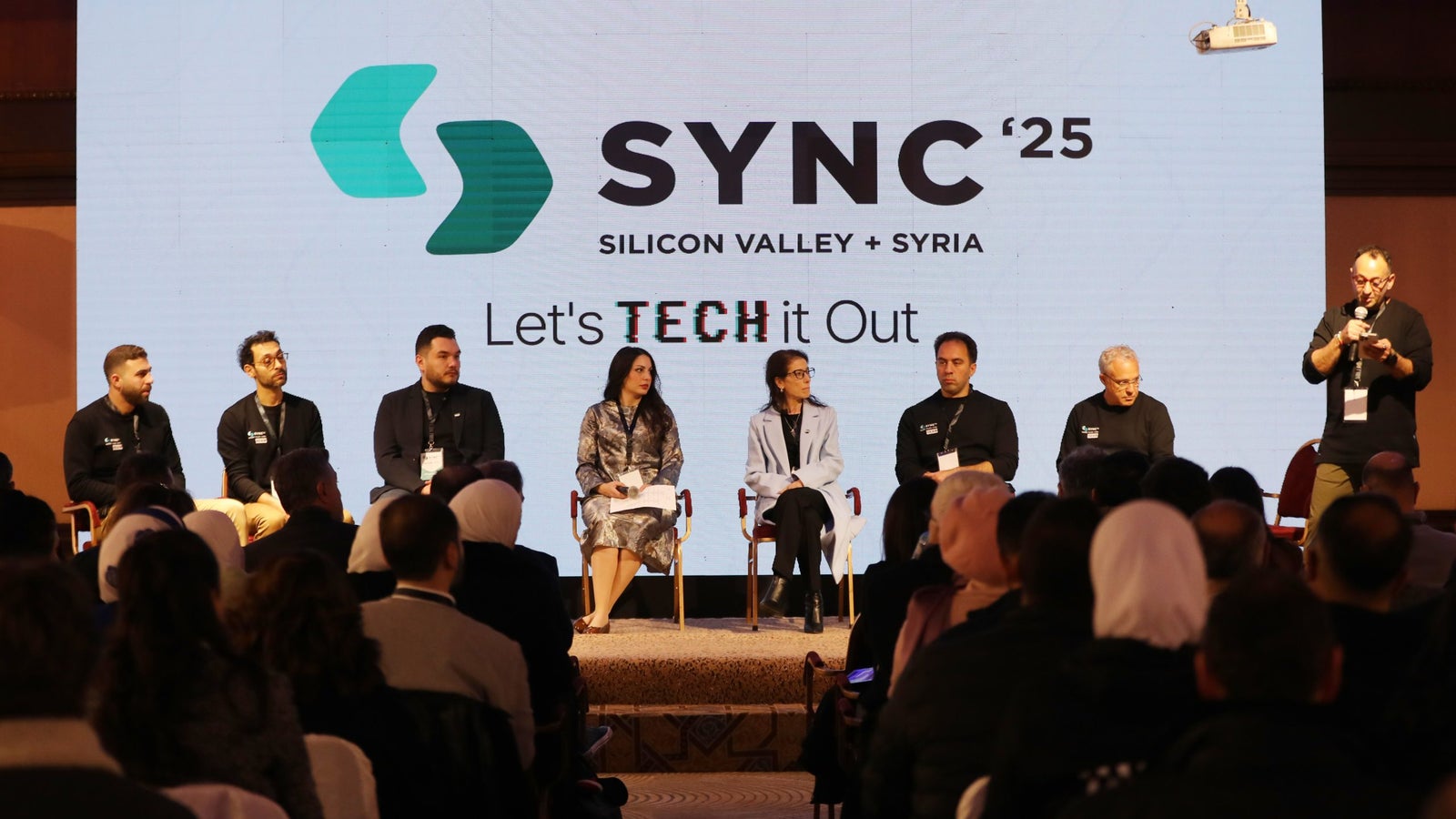
The 2025 SYNC conference in Damascus.
One of those returning home to help organize the conference was Abdulwahab Omira. At the age of 14, Omira was already the owner of several patents. That had made him a target for authorities. After spending time in the country’s notorious prisons in 2012, he had left Syria with his family as a teenager. Now a 28-year-old U.S. citizen and Stanford graduate living in Chicago, Omira knew the road ahead for Syrian entrepreneurs would be extremely challenging.
Like many returnees, he found his family home in ruins when he visited last December. Much of his neighborhood, the historic suburb of Jobar just northeast of the Old City of Damascus, was now uninhabitable. Amid rubble and artillery casings, he found his tattered computer science book from seventh grade, and the smell of his grandmother’s jasmine tree, still blossoming. “I have lived my whole life wondering if this moment would ever come,” he told Rest of World. “As I was digging through the rubble, I thought, ‘Okay, we’re back. It’s time to rebuild.’”
I have lived my whole life wondering if this moment would ever come.”
Another SYNC organizer, Bassel Ojjeh, is a Syrian-born entrepreneur and the co-founder and CEO of LigaData, a Silicon Valley-based company that provides data and AI-driven telecom products. He described Syria as a “greenfield” of opportunity. “Here is a market of 22 million people that needs absolutely everything, because they have had nothing,” he told Rest of World.
Ojjeh was impressed by the energy and ingenuity of the country’s potential workforce, explaining that just to survive daily life, Syrians required a level of innovation U.S. companies could tap. And he couldn’t believe the number of talented female software engineers: “Silicon Valley would die for [that], because they just don’t have the numbers.” He added, “When you’re in Silicon Valley, you never really think of the ordinary. You’re always thinking of the disruptive. Syria will be the ultimate disrupter.”
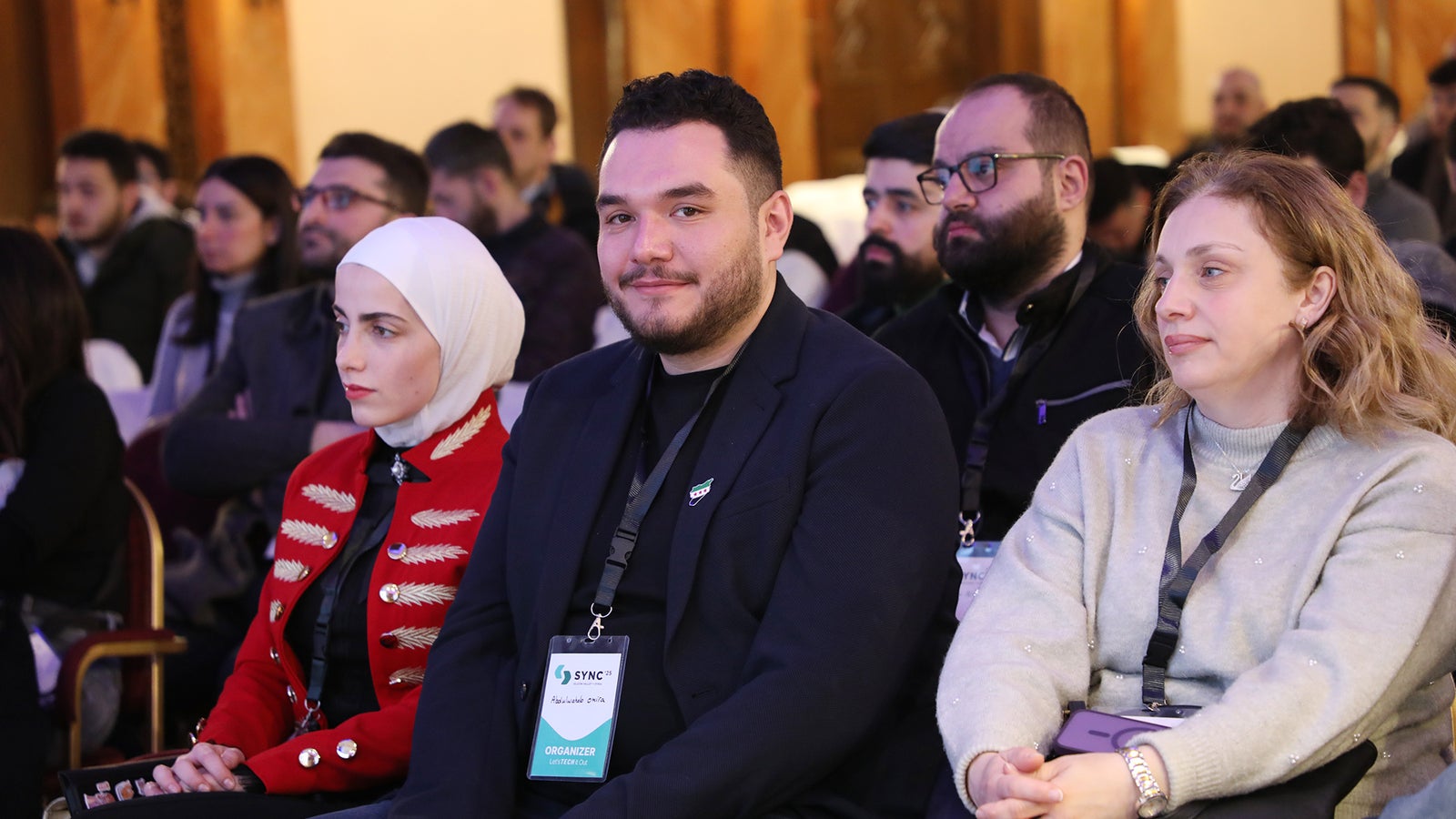
Abdulwahab Omira at SYNC.
At the end of the SYNC conference, Omira, Ojjeh, and a handful of colleagues from the industry were invited to a last-minute meeting with Syria’s new leader, Sharaa. They met inside Syria’s presidential palace, a fortress-like structure that for decades was one of the most secretive buildings in the country.
Before returning to Syria, Omira had been hesitant about a government led by Hayat Tahrir al-Sham. But at the meeting in the presidential palace, he found Sharaa to be open-minded, familiar with various AI tools, and enthusiastic about the tech scene. “He has an entrepreneurial mindset,” he said.
Sharaa had swapped his military fatigues for a suit and tie, and was working to reshape Syria’s international narrative — courting investors and shaking hands with multiple foreign leaders to signal Syria’s readiness for reconstruction and normalized diplomatic relations with the rest of the world.
On the night of May 13, Syrians packed into the country’s streets and squares, clapping, singing, and making peace signs for mobile-phone cameras raised high in the air. U.S. President Donald Trump had just made a shock announcement, during a trip to Saudi Arabia, that he was lifting sanctions on Syria. “It’s their time to shine. We’re taking them all off,” Trump said. “Good luck, Syria. Show us something very special.”

Damascus residents celebrate the lifting of U.S. sanctions on Syria.
Shortly afterward, YallaGo shared a celebratory message with its customers. “To the Syrian people: the hero of the past years and the creator of the future,” it read. The message was accompanied by a 20% discount code: YALLATRUMP.
The lifting of sanctions accelerated the ambitions of Moustafa, the company’s founder. He told Rest of World afterward that he wants YallaGo to grow into Syria’s top super-app, and include everything from smart mobility solutions to e-payment systems. In the weeks following Trump’s announcement, the company expanded to three more cities, hired more staff, and started discussions with authorities about introducing tech-driven improvements to public transportation, such as real-time tracking and bus booking systems. Moustafa said YallaGo also received interest from investors in the Arabian Gulf, EU, and U.S. — but that, for now, the company isn’t looking for outside funding.
The U.S. also lifted its terrorist designation of HTS and Sharaa, saying it “recognizes the positive actions taken by the new Syrian government.” But the assumption that sanctions will soon be fully lifted is “entirely unrealistic,” Karam Shaar, the chief economic consultant to the Office of the United Nations Resident Coordinator in Syria, told Rest of World. He explained that while executive sanctions can be removed by Trump, removing statutory sanctions will require U.S. congressional approval.
Even so, as the removal of sanctions begins to take effect, Shaar is hopeful that Syrian companies will soon find it easier to operate in a globalized tech sector. International banks, corporations, and institutions will need clear, formal regulatory guidance before reengaging with the country. Foreign investment will take time, but Shaar believes it might not be long — as soon as months — before global online services such as Google Workspace, Zoom, Slack, and Facebook are accessible.
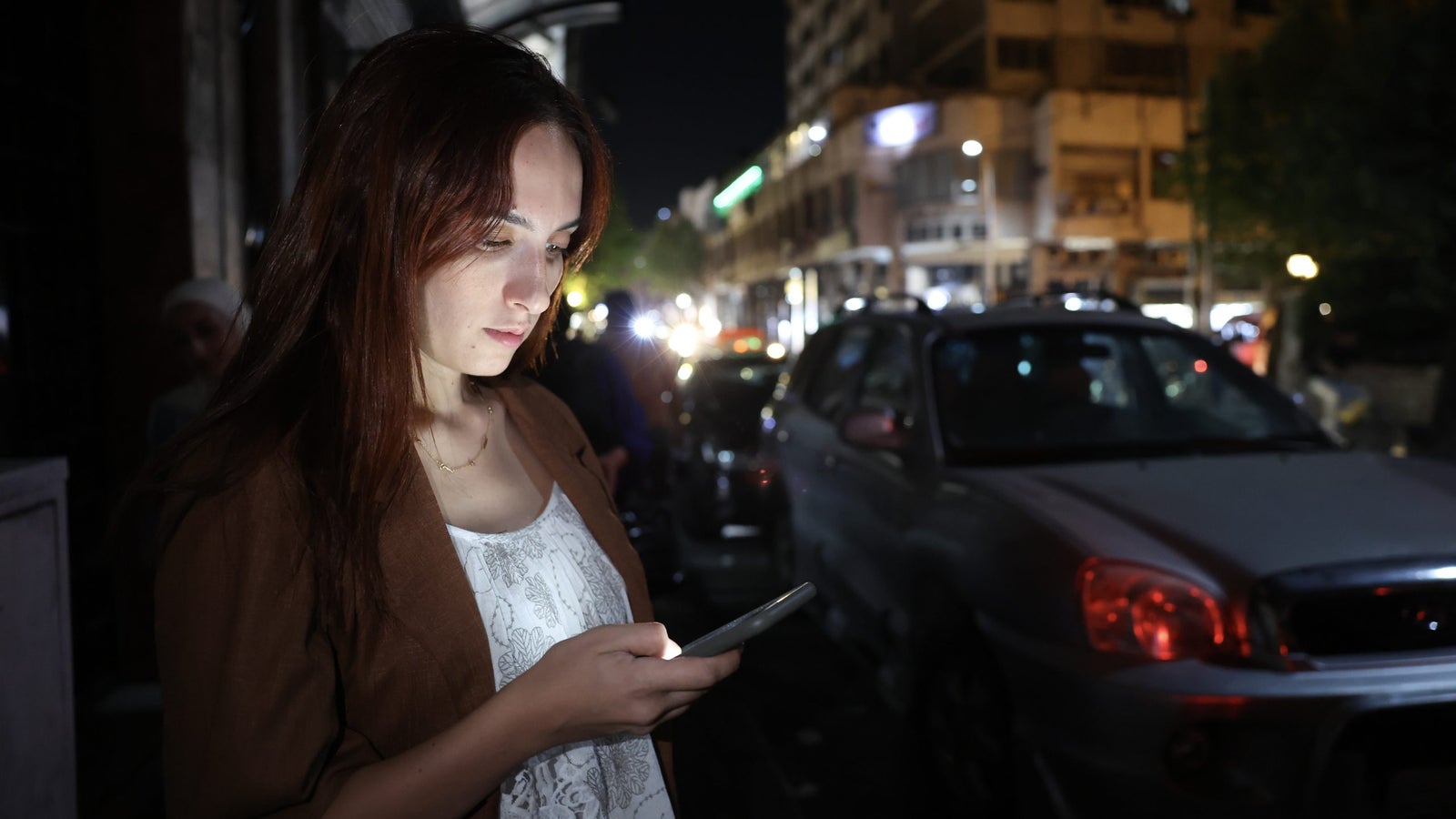
The bustling Al Abed Street in central Damascus.
Deodat Maharaj, managing director of the UN Technology Bank for the Least Developed Countries, told Rest of World that Syria does have the potential for a more buoyant tech sector if the new government can fix and upgrade its digital public infrastructure. He believes that Syrians who survived the war have proven their unique resilience, while those returning to the country will help drive change. “The Syrian diaspora is a massive diaspora,” he said. “It’s a wealthy diaspora, and it’s a highly trained diaspora and very closely connected with Syria up to this day.”
Still, the scale of the challenge is hard to overstate. A World Bank report published in July notes the country’s economy is still navigating “extraordinarily high” levels of uncertainty and lays out the stark impact of conflict. Syria’s GDP contracted by more than 50% between 2010 and 2022. The World Bank estimates that one in four Syrians live in extreme poverty. Exports have collapsed. Citizens and businesses alike weathered average inflation over 50% during 13 years of war. Security continues to be a major concern, with sectarian clashes, unresolved territorial disputes, and Israeli airstrikes underscoring just how vulnerable and fragile the country remains.
Tech entrepreneurs hope they can start to unlock Syria’s redevelopment, while providing tech-based solutions to improve people’s lives. But a large-scale economic recovery — with a full-fledged tech boom — will likely be a long and grinding process.
The day that Trump announced the lifting of sanctions, Hourani did not join the street parties in Damascus. Instead, he celebrated with his family. “I went home and said, ‘Congratulations!’ And my family asked me if I was getting married. And I said, no, the sanctions have been lifted,” he recalled.
He then got back to work, conferring with his business partner and colleagues about the future of Quizat. “I believe that the future is ours in Syria,” he said. “The most important thing is that we will remain operating. No one is going to stop us.”
Quizat also launched its own special discount code that day: Freedom.
